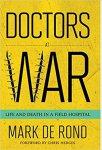A few days holiday allow space for recording a few books read recently.
Doctors at War, ethnographer Professor Mark de Rond’s powerful record of his time embedded with a medical unit at Camp Bastian in
Afghanistan, provokes much thought and emotion. It is clear that exposure to the sheer unnecessary and seemingly random suffering of ordinary people as well as combatants raises questions of theodicy. This disturbs Mark’s own faith questions, and leads him ultimately to an expression of atheism. Reading the book, however, provoked in me a different question: not how we account for suffering and evil, but, rather, how we account for joy in a world of such suffering? This is not glib; I would love to see a further discussion of it.
At the other end of the scale is Simon Jenkins’ entertaining romp
through Christian faith and its oddities,
Jumble Sales of the Apocalypse. The book comprises columns Simon published in the United Reformed Church (not ‘Reform’ as it says in the book itself) magazine Reform. Making theology simple and accessible is not as easy as Simon makes it look. He shines an unusual light from an unusual angle to open up our thinking and not close it down. As I know from years of writing scripts for Radio 2, this isn’t always an obvious or simple task.
Sitting here in Berlin waiting for a thunder storm to break, it is worth
recommending James Hawes breathless race through the entire history of Germany.
The Shortest History of Germany is excellent and enlightening, but it is clear he neither likes nor trusts Prussians. A better overview of Europe’s most important country you will not find – and in these days of Brexit and Trump, with a German election coming up later this year, it is worth the quick read.
Finally for now, Tom Fletcher’s book about the impac of digital change
on international diplomacy,
The Naked Diplomat, is excellent. Again, an easy read, it says a lot about communication, leadership and handling change. It also contains the most memorable quote about diplomacy – inevitably from Winston Churchill: “Diplomacy is the art of telling people to go to hell in such a way that they ask for directions.”
Discuss.
Advertisements




